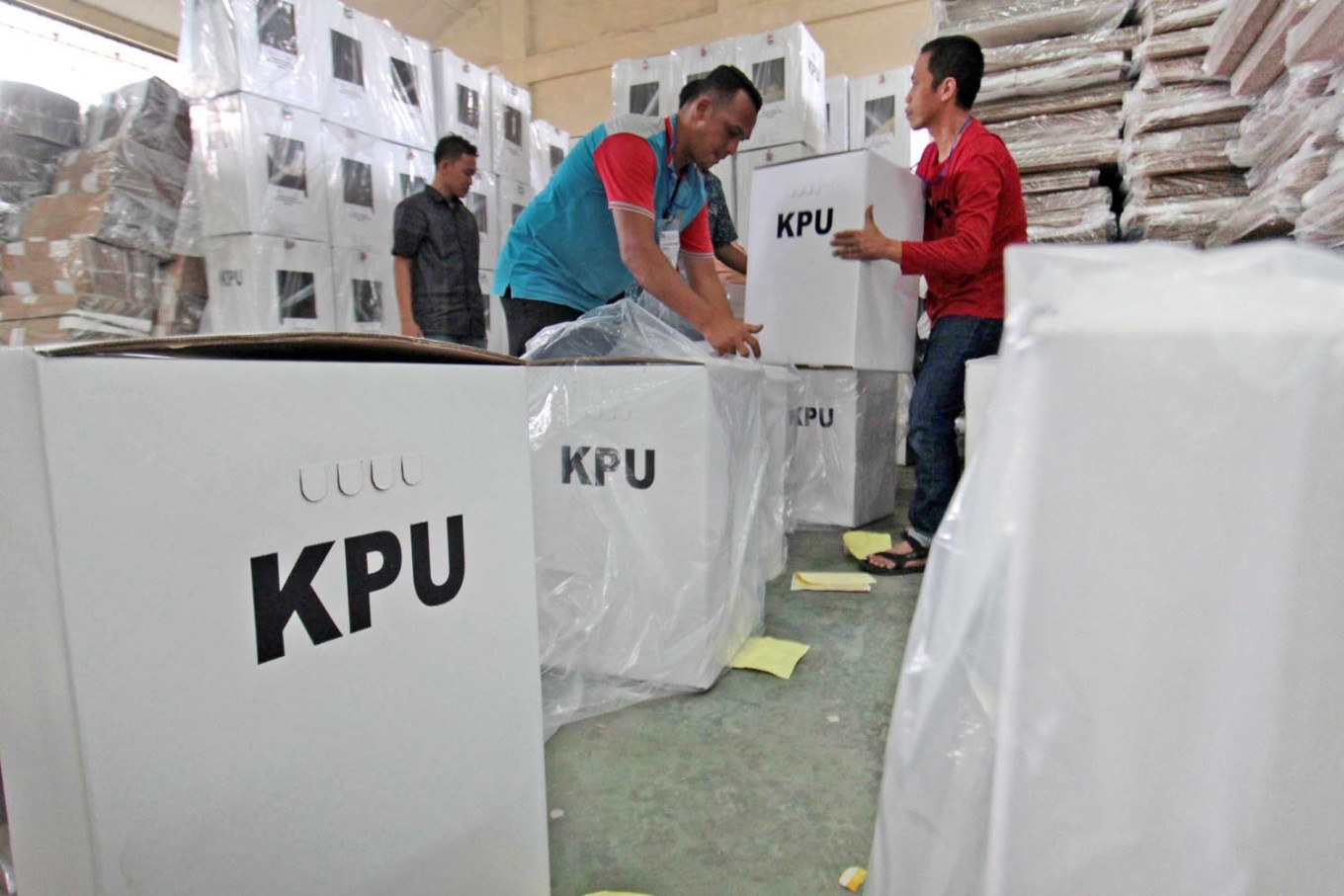Popular Reads
Top Results
Can't find what you're looking for?
View all search resultsPopular Reads
Top Results
Can't find what you're looking for?
View all search resultsKPU prepares health protocols as government insists on holding year-end regional polls
As the government insists on holding the 2020 simultaneous regional elections in December despite COVID-19 risks, the General Elections Commission (KPU) is now preparing health protocols to prevent the elections from becoming new sources of virus transmission.
Change text size
Gift Premium Articles
to Anyone
T
he General Elections Commission (KPU) is preparing health protocols to prevent COVID-19 transmission during the 2020 simultaneous regional elections, which the government has insisted on holding in December despite the health risks.
The protocols, which will be laid out in a set of new KPU regulations, will be mandatory for KPU officers, candidates and voters during all stages of the elections, from the preparations starting from June 15 to the final vote count a week after voting day.
“We have coordinated with the Health Ministry and the COVID-19 national task force to prepare for health protocols,” KPU commissioner I Dewa Kade Wiarsa Raka Sandi said in a virtual public discussion on Saturday.
The move follows a decision by the government and the House of Representatives on May 27 to hold the regional elections on Dec. 9 to elect 270 regional leaders, comprising nine governors, 224 regents and 37 mayors. The elections were pushed back for around three months from their initial schedule of Sept. 23 after President Joko "Jokowi" Widodo issued in May a regulation in lieu of law that mandated election organizers, the House and the government to decide on a new date for the ballot.
Critics have urged policymakers to push back the elections to 2021 over fears the COVID-19 outbreak could continue late into the year – and even beyond it – and put voters and election organizers at risk of contracting the disease. They also expressed concern about low voter turnout should the outbreak in the country show no signs of abating, thus discouraging people from showing up at polling stations.
Read also: COVID-19: House, watchdog call for delay of regional elections
Dewa said, however, that health protocols and their strict implementation would be sufficient to protect voters and KPU officers from infection.
The KPU is also adjusting some election procedures, including limiting the number of election campaign participants permitted to be present in indoor facilities to 20 people. It will also prohibit candidates from hosting campaign events that could attract massive crowds, such as music concerts, sporting events, bazaars and blood drives.
The commission will still allow candidates to install and distribute campaign props, but it is also advising them to look to social media to campaign.
The number of registered voters per polling station will be reduced from 800 voters to 500 to comply with physical distancing measures. Voters will be obliged to wear face masks and disposable gloves when voting, while polling stations should provide hand sanitizer, disinfectant and body temperature scanners on site.
Any voters with body temperatures above 38 degrees Celsius will be banned from entering polling stations. Election officials will escort them to vote in specific polling stations.
Registered voters found to be positive for COVID-19, patients under surveillance (PDP) and people under surveillance (ODP) will be allowed to cast their vote after 12 p.m., an hour before voting closes, at designated polling stations at nearby hospitals.
These special polling stations will be managed by three polling station administrators (KPPS), consisting of regional KPU officers and hospital management representatives, who must wear personal protective equipment (PPE), transparent face shields and gloves.
“But the long list of the new protocols requires additional budget funds,” Dewa added.
The KPU previously estimated that the additional safeguards would add about Rp 536 billion (US$35.72 million) to the current regional election budget of around Rp 10 trillion, but the source of the extra budget remains unclear.
Read also: Year-end regional polls risk low turnout due to virus fears
Fadli Ramadanil of election watchdog the Association for Elections and Democracy (Perludem) warned of possible delays in PPE procurement for the elections due to uncertainty over the financing of health protocols’ extra budget. He said the lack of budget would eventually affect the overall preparation stages and might put the balloting behind schedule, recommending the KPU to postpone the elections until next year.
Activist Jerry Sumampouw from the Indonesian Voters Committee (TEPI) urged the commission to seek help from the COVID-19 task force to procure PPE.
The Home Ministry’s acting director general for political affairs and general administration, Bahtiar, said that the government was exploring whether the state budget allocated for the COVID-19 task force could be used for procuring PPE and other health equipment during the elections.
The government has allocated Rp 3.14 trillion for the task force to procure protective gear and pay for the treatment of COVID-19 patients in hospitals across the country.
"The KPU should only focus on preparing for the elections as another agency has taken the responsibility of providing health equipment,” Bahtiar said.










